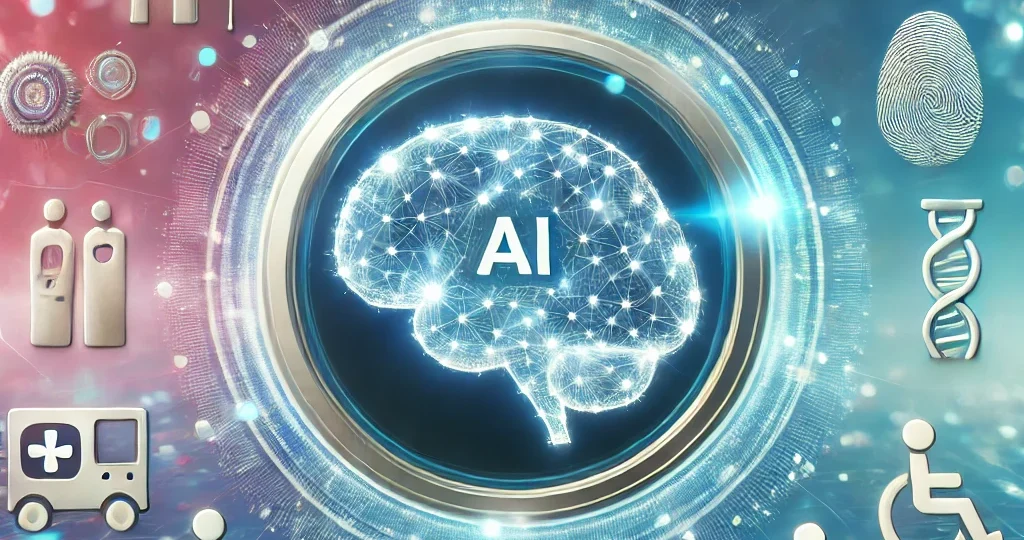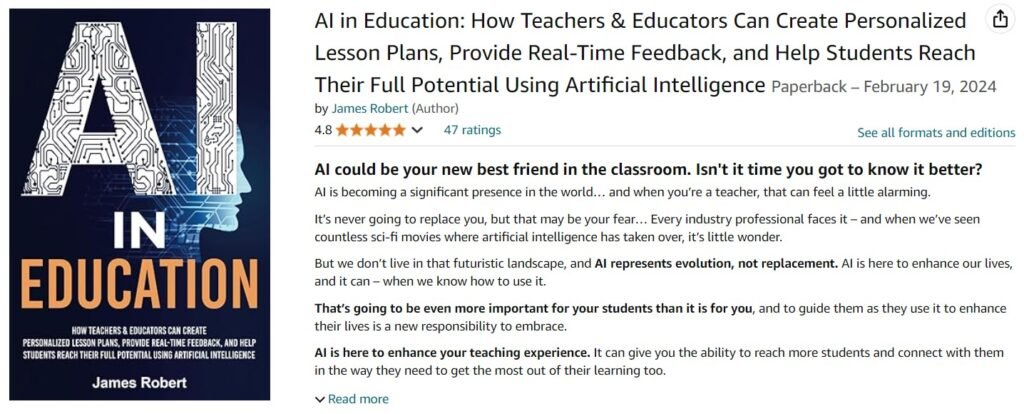How AI Can Be Used For The Best: Unique Applications in Research and Beyond
October 3, 2024 | by Jean Twizeyimana

Learn How AI Can Be Used For Good. AI is (and already is) enabling research, medicine, and general accessibility. Still, it’s not just about having an excellent calculator in your wallet anymore — this is AI opening up new possibilities that no other technology can achieve. Learn about AI for good. Countless industries are revolutionized by Artificial Intelligence (AI), from chip design to climate science to healthcare and disability support. AI does make big news headlines as a disruptive technology, but its real value is in its unique ability to solve problems that no other technology can. With that being said, in this article, we look at how AI positively changes research and gives solutions that can not be achieved with this traditional method. So, let’s look at some specific examples of exactly how irreplaceable AI has become today.
1. Unique Role of AI in Research
However, AI could be our most significant contribution to research, offering the tools that allow this information to unlock new frontiers in science and technology. Traditional methods commonly don’t cut when processing massive datasets or identifying intricate patterns. Yet, in one way, AI is perhaps exceptionally well suited to the task, as AI can learn from complicated data rapidly and efficiently and discover insights that human researchers — let alone conventional computers — may be unable to. In biological research, AI can help pave chemistry pathways that relate molecular interaction to drug discovery. Second, it automates the tedious but essential tasks of hypothesis testing, experimental optimization, and such. An AI’s ability makes it vital in science, such as genetics, medicine, and environmental science.
2. AI and Disability Support: Transforming Accessibility Research
AI-driven research has led to remarkable advancements in assistive technologies that are transforming the lives of people with disabilities. No other technology has been as effective in enhancing accessibility.
- AI-powered prosthetics are meant to learn and adapt to meet the user’s unique needs, leading to more personalized and functional functions than traditional prosthetics.
- Speech recognition and real-time translation AI help individuals with hearing impairments by offering real-time sign language translation, making communication seamless.
- Machine vision for the visually impaired, It’s a big deal, like Microsoft’s Seeing AI app. By employing AI to produce a virtual representation of the world based on auditory feedback, the visually impaired can traverse spaces and perceive the environment around them in real-time.
The dynamic learning capabilities of AI make it unique from all the static technology of the past, which allowed these advancements to occur.
3. AI in Medicine: Driving Research Beyond Human Capability
AI has been a great boon to the research side of the healthcare industry. By accepting enormous amounts of biomedical data, AI models can make breakthrough discoveries that would be impossible with traditional methods.
- AI in drug discovery: Traditional drug development can take years, but AI-powered models analyze chemical compounds and predict interactions, reducing the time needed to develop new treatments.
- Early disease detection: One area where we’re seeing AI transform the landscape is diagnostic tools, such as AI, which can identify whether someone has a disease like cancer or Alzheimer’s with greater accuracy than human eyes.
- Personalized medicine: AI combines genetic and historical data to craft individualized and personalized treatment plans that weren’t possible prior.
DeepMind’s AlphaFold is the most striking example of AI excelling in medicine—it has solved the protein folding problem, a problem that has eluded researchers for more than 50 years. Thanks to this breakthrough, AI is going to be an indispensable research tool. It will speed up drug design, enzyme engineering, and even agriculture.
4. AI in Designing Better Chips: Researching Innovations Beyond Traditional Engineering
Both chip design and semiconductor research are critical areas in powering modern technology; AI plays a vital role. Traditional chip design takes years of knowledge and a trial-and-error approach. However, AI can make these designs far more effective.
- AI in chip optimization: Examples of how companies like Google test out AI to make chips faster and more efficient have emerged. AI goes through endless combinations of design to find the best, far beyond what could be done with a traditional engineering approach.
- AI in semiconductor innovation: AI has pushed to the limits techniques for miniaturization and performance improvement, and people cannot do this without AI’s support.
5. AI in Climate Science: Breakthroughs Unmatched by Traditional Models
AI is also making substantial contributions to climate research. Complex environmental data requires sophisticated models to make accurate predictions, and AI excels in this area.
- AI-driven climate change predictions: However, traditional climate models are often slow and have a limited scope. With immensity, AI can process enormous amounts of data to predict changes in the long run or extreme weather events with unheard-of accuracy.
- AI for carbon capture research: AI is being used to design materials and processes for carbon capture, reducing the time and costs of trial and error in climate science.
Through AI, scientists are making faster progress in understanding climate patterns and devising sustainable solutions to mitigate environmental challenges.
6. AI as a Tool for Social Good in Research Fields
Beyond specific industries, AI has the potential to bring about social good in a variety of research domains:
- Education: Adaptive learning platforms with AI enable personalized learning experiences for individuals beyond what any other technology can create.
- Language preservation: Research on endangered languages uses AI to document and preserve cultural infrastructure that remains with the language.
- Global health: AI-driven models in epidemiology help predict the spread of diseases, aiding in more effective public health responses and vaccine development.
7. Ethical Considerations in AI-Driven Research
With all the potential good that AI has already shown, the ethical implications are still central. For example, there may be biases in the training data in healthcare AI or unequal treatment outcomes. To harness the best of AI, realize its risks, and minimize its risks, we need responsible AI development and transparent AI research.
Conclusion
As a research field, the work that you’re doing couldn’t be more perfect for AI because AI offers an unparalleled ability to bring positive change. AI has already proved itself to unlock solutions and innovations that were, until recently, unimaginable, from personalized medicine and chip design to climate science and accessibility. And we can continue investing in responsible AI research, so as we inch closer to that better, more inclusive future, we can expect even more groundbreaking.
Are you excited? Here are popular AI tools that are making waves in the research community:
- Iris.ai: An AI science assistant that helps with literature exploration and summarization.
- SciSpace: Offers AI-powered literature search and paper summaries.
- Jenni AI: Try Jenni AI today It can boost your writing’s intelligence, speed, and efficiency
- Elicit An AI research assistant who can help formulate research questions and find relevant papers.
- Semantic Scholar: Uses AI to help you discover and understand scientific literature.
Related Articles
- Exploring The AI Qualitative Data Analysis in Surveys Now
- Revolutionize Your Research: Machine Learning Survey Analysis in 2024
- Latest AI in Survey Research: From Design to Analysis
- The Ultimate Guide to AI in Survey Research
- The Latest AI Sentiment Analysis Techniques for Survey Responses
- How To Overcome Survey Data Bias Using AI
- How To Leverage Natural Language Processing (NLP) for Open-Ended Survey Questions
AI and Machine Learning Tools
- Hands-On Machine Learning with Scikit-Learn, Keras, and TensorFlow
- Artificial Intelligence: A Guide for Thinking Humans


Try AI Tools in Your Research:
1. Jenni AI (for Academic Writing)
- Try Jenni AI today. It can boost your writing’s intelligence, speed, and efficiency.
2. SciSpace (for Literature Reviews)
- Monthly Subscription: Get 20% off with the code
JEAN20Try SciSpace - Annual Subscription: Get 40% off with the code
JEAN40Try SciSpace
2. Elicit (for Formulating Research Questions and Finding Relevant Papers)
RELATED POSTS
View all











![MOUNT-IT! Sit Stand Monitor Desk Mount [Fits 32" Screens] Height Adjustable, Full-Motion Articulating Arm with Keyboard Tray and Cable Management (Black)](https://jeantwizeyimana.com/wp-content/uploads/2024/09/Sit-Stand-Monitor-Desk-Mount-Height-Adjustable-Full-Motion.jpg)



